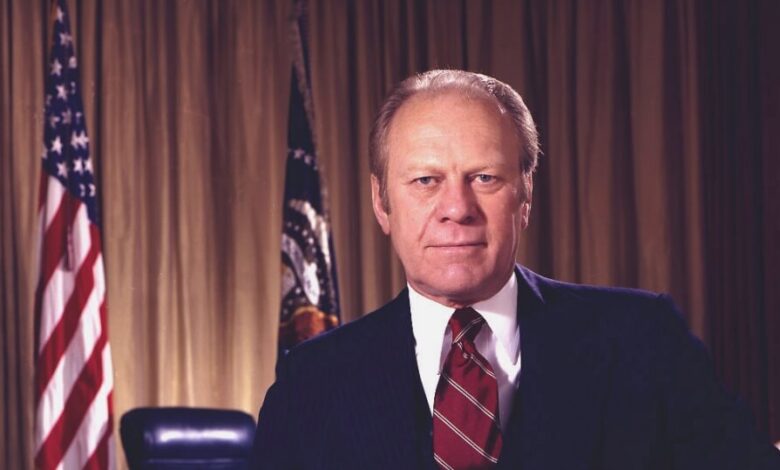The Life and Legacy of Gerald Ford

Gerald Ford, the 38th President of the United States, holds a unique place in American history. Known for his steady leadership during one of the country’s most turbulent times, Ford was the only person to become both Vice President and President without being elected to either office. His integrity, calm demeanor, and commitment to healing a divided nation have left a lasting legacy.
Early Life and Education
Gerald Rudolph Ford Jr. was born on July 14, 1913, in Omaha, Nebraska. He was originally named Leslie Lynch King Jr., after his biological father, but was later renamed after his stepfather, Gerald Rudolff Ford Sr., who raised him in Grand Rapids, Michigan. Ford attended the University of Michigan, where he was a standout football player. He later earned a law degree from Yale Law School.
Military and Political Career
During World War II, Ford served with distinction in the U.S. Navy. After the war, he entered politics, winning a seat in the House of Representatives in 1948. He served in Congress for 25 years and eventually became the House Minority Leader in 1965. His reputation for honesty and bipartisanship made him a respected figure in Washington.
The Accidental President
In 1973, Vice President Spiro Agnew resigned amid scandal, and President Richard Nixon nominated Ford to replace him. Just months later, Nixon himself resigned due to the Watergate scandal. On August 9, 1974, Gerald Ford became President.
In his first address as President, Ford famously declared, “Our long national nightmare is over.” He inherited a nation shaken by scandal, economic woes, and waning trust in government. His decision to pardon Nixon was controversial but made in the hope of helping the country move forward.
Policies and Leadership
Ford focused on restoring confidence in the presidency and the American system of government. He faced significant economic challenges, including inflation and unemployment. His “Whip Inflation Now” (WIN) campaign aimed to curb rising prices, though it had limited success.
In foreign affairs, Ford continued détente with the Soviet Union and oversaw the final stages of U.S. involvement in Vietnam, including the evacuation of American personnel and South Vietnamese allies in 1975.
Post-Presidency Years
After losing the 1976 election to Jimmy Carter, Ford retired from political life but remained active in public affairs. He served on several corporate boards and became a respected elder statesman, often called upon for advice and reflection on national issues.
Legacy
Gerald Ford is remembered as a man of principle and decency. Though his presidency was brief, it was pivotal. He helped restore faith in the American government during a time of unprecedented cynicism. His courageous and controversial decision to pardon Nixon likely cost him reelection but demonstrated his prioritization of national unity over personal political gain.
In 2006, shortly after his death at age 93, many tributes highlighted his unshakable integrity and quiet strength. Today, the Gerald R. Ford Presidential Library and Museum stands as a testament to his life and service.
Conclusion
Gerald Ford’s legacy is one of healing, honesty, and humility. He may not have sought the highest office, but when called upon, he answered with grace and honor. In an era that tested the American spirit, Ford reminded the nation of the enduring values of leadership rooted in character, not ambition.
(FAQs) about Gerald Ford
Q1: Who was Gerald Ford?
A: Gerald Ford was the 38th President of the United States, serving from 1974 to 1977. He is known for succeeding Richard Nixon following the Watergate scandal and for being the only U.S. President who was never elected to the presidency or vice presidency.
Q2: When and where was Gerald Ford born?
A: He was born on July 14, 1913, in Omaha, Nebraska, and was raised in Grand Rapids, Michigan.
Q3: What was Gerald Ford’s original name?
A: He was born Leslie Lynch King Jr. but later took the name of his stepfather, Gerald Rudolff Ford Sr.
Q4: Why did Gerald Ford become president without being elected?
A: Ford was appointed Vice President after Spiro Agnew resigned. He then became President when Richard Nixon resigned in 1974 due to the Watergate scandal.
Also Read: The Life and Legacy of Lindsay Lohan
Q5: Why did Gerald Ford pardon Richard Nixon?
A: Ford pardoned Nixon to help the nation move forward and heal after the Watergate scandal. The decision was controversial but intended to prevent a prolonged national crisis.
Q6: What were some of the challenges during Ford’s presidency?
A: Ford faced high inflation, economic recession, energy shortages, and the aftermath of the Vietnam War, in addition to public distrust of the government.
Q7: Did Gerald Ford serve in the military?
A: Yes, he served in the U.S. Navy during World War II and earned several commendations for his service.
Q8: What did Gerald Ford do after his presidency?
A: After leaving office, Ford remained active in public life, served on corporate boards, gave speeches, and participated in public policy discussions until his death in 2006.
Q9: When did Gerald Ford die?
A: He died on December 26, 2006, at the age of 93, making him the longest-living U.S. president at the time.
Q10: What is Gerald Ford’s lasting legacy?
A: Ford is remembered for his honesty, courage, and dedication to restoring trust in the presidency during a national crisis.



